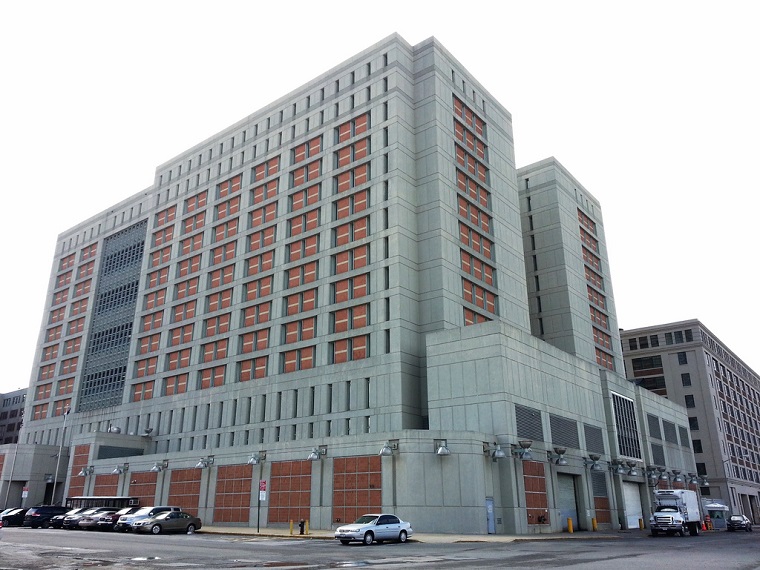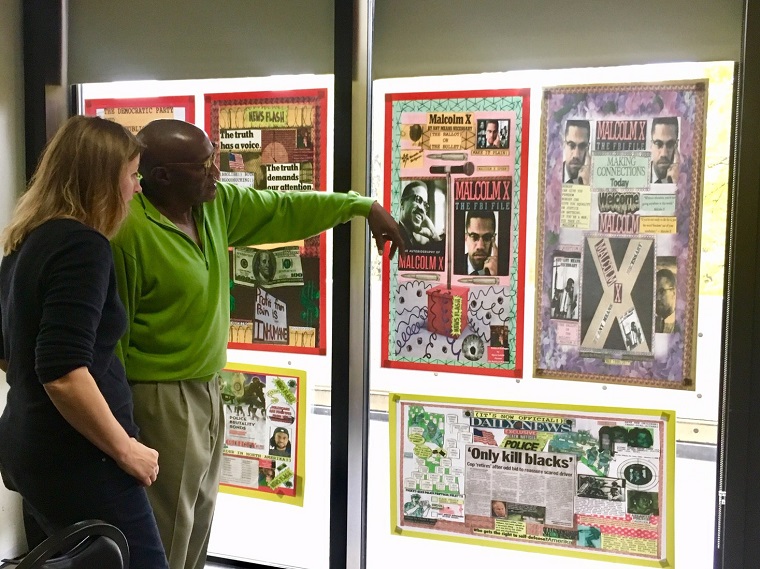
Metropolitan Detention Center in Brooklyn, where people went without heat and electricity in freezing temperatures – prompting mass protests. Matt Green via Flickr
We must demand community oversight for every federal, state, and county facility in the U.S.
Recent headlines over the plight of people imprisoned in the Metropolitan Detention Center (MDC) in Brooklyn begs for a deeper look into the conditions of confinement in the U.S. prisons, jails, and juvenile and immigrant detention facilities. Although the electricity and heat are back on at the Brooklyn federal facility, the continuing and staggering neglect that led to this humanitarian crises continues – and will continue. Not only did the federal officials lie about conditions at the facility, they refuse to acknowledge the situation as part of a deeper human rights crisis.
For the staff and volunteers at the AFSC Healing Justice and Prison Watch Programs, what happened in Brooklyn reflects the heart-rending testimonies we receive daily from prisoners and their families throughout the country. We hear about how prisons use isolation for immigrants, distribute poor-quality food made being provided by companies, lack appropriate physical and psychological medical care, and neglect the elderly and youth. The culture of cruelty from one human to another is often beyond understanding, and certainly beyond being acceptable.
In the same week that the MDC prisoners called out of their windows to protestors and family members that they were without heat, hot water, electricity and sanitation, we received word of arsenic being found in the water of the Atlanta federal facility.
In another letter, we received the following testimony from South Woods State Prison in New Jersey: “THIS IS A PLACE FOR INMATES THAT ARE VERY SICK AND WAITING TO DIE. They can’t get out of bed to use the bathroom and are forced to do it in the bed. Medical staff lets them lay for days in their own waste. Inmates for days don’t get showers and those that are aging in wheel chairs have no nurses to help them clean themselves. No one cares about the beating of inmates, or those laying in bed crying for help. I believe that this is because this prison is 85% white staff and the units are 90% black inmates.”
This is also the same week we received news of a 36-year-old woman being locked up in an Indiana jail for a probation violation. Lamekia Dockery begged for medical attention for her stomach pains. She was vomiting, unable to eat, sprawled out on the floor stating she couldn’t breathe. The corrections officer’s blog read, “I advised her to stop talking to me.”
Lamekia had been sent to this work release center after she violated probation for a shoplifting conviction. She died six days later of sepsis. In the end, she received a sentence of death for a minor violation.
Each summer in 7 wing at New Jersey State Prison, temperatures in that solitary confinement unit -- built in the 1860s -- rises to 110 degrees or hotter. This has been confirmed to me by the Department of Corrections. I have had the heartbreaking experience of speaking at the funeral of an activist prisoner who died in of heatstroke in that unit. I have held his mother and his brother. Hatari wa’ Haki was one of the people who consistently reached out to the AFSC, so we could understand with depth the torturous the conditions in that prison. His devastated brother now volunteers for the Service Committee.
Our U.S. system of “justice” is supposed to separate out people who have been found guilty of transgression -- not torture them. With well over two million people imprisoned in the U.S., the number of families impacted by conditions of confinement in prisons is profound. Not a day goes by that AFSC doesn’t receive complaints from people in prison and their families describing conditions, including cold, filth, rats, roaches, mold, callous medical care, extended isolation often lasting years, use of devices of torture, harassment, brutality, and racism. We’ve received testimonies and drawings of four- and five-point restraints, restraint hoods, restraint beds, stun guns, stun grenades, spit hoods, chain gangs, extreme light or dark, extreme heat or cold. The people inside tell us that this is a systematic attack on all human stimuli.
We, as advocates and activists need to push for community oversight for every federal, state and county facility, including juvenile and immigrant detention facilities. Whether that oversight is legislated or an informal coalition of family members, it is crucial to the physical and mental well-being of our very vulnerable imprisoned and their loved ones.
These conditions also speak to a profound and national spiritual crisis. Is this really who we, as a nation, want to be? Without forms of oversight, people with power in these spaces are committing and allowing torture with impunity. Departments of Corrections and the Federal Bureau of Prisons are more than a set of institutions. They are also a state of mind. That state of mind is what led to the events at MDC and what is experienced every single day by those imprisoned in this country. We laud the courage of people who have no power bravely speaking truth to the powerful.
AFSC is working with many groups and coalitions towards a national anti-racist movement against torture and prisons among people who dare to believe that human rights belong to each of us -- that over two million men, women, and children need not be imprisoned to make the rest of us feel safe. We are bonded with prisoners, ex-prisoners, their families, faith-based and civil society organizations in this country when we say loudly and collectively “not in my name.”
There is an adage that says, “Apartheid was legal, the Holocausts were legal, slavery was legal, colonialism was legal. Legality is a matter of power, not justice.” Empowering prisoners, their loved ones, and ourselves through community oversight of our criminal legal system is a spiritually crucial imperative.
To learn more about the experiences of people in prison, visit AFSC Prison Watch page for reports and other resources.